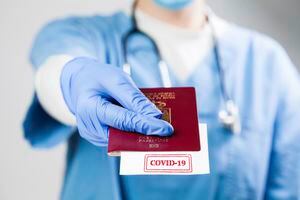The price of freedom?
Guernsey’s data protection commissioner Emma Martins considers the issues surrounding the idea of vaccination passports

IT HAS been announced recently that the European Commission is considering rolling out a vaccination ‘passport’ or ‘digital green pass’ for those who have had the Covid-19 vaccination, which will allow more freedom to travel. In the UK, the government has announced that Michael Gove will lead a review into the feasibility of vaccine passports.
Our own government is likely to be considering what options may be available for Bailiwick residents in the coming months as the vaccine programme continues apace.
It is unsurprising that, after many difficult months of being apart from loved ones, and for some even losing loved ones, we are so eager to explore solutions which may see some of the restrictions on our lives ease.
But it speaks to an undercurrent of concern that politicians from all sides have been downplaying the idea of these passports until recently.
It is one of those ‘solutions’ that at first seems so beguilingly simple and obvious. We are in the midst of a global crisis and desperate for solutions and this desperation may encourage us to circumvent some of the conversations and scrutiny that a world free of a dreadful pandemic would more readily allow.
You may well think that it’s an odd thing for a data regulator to be asked to comment on. I am, of course, no public health or vaccine expert. But as is increasingly the case in this digital era, conversations about significant legal and policy issues invariably involve data, and lots of it. Indeed, in this case, if we are talking about the roll-out of vaccination passports then your ability to go on holiday, eat at a restaurant, be employed, may well be determined by a record held either centrally or on your digital device.
With momentum gaining around vaccine passport discussions, we have begun to see conversations around some of the practical and legal realities that such a regime would present. The scale of the potential impact for those included and excluded is huge. It could mean certain individuals lose their job, are unable to enter public buildings, go on public transport, go on holidays etc. Therefore, in addition to the role of data protection in the handling of the personal data involved, there is also employment, health and safety, discrimination and a myriad of other areas to consider.
The danger of having to look to a wide range of complex rules, regulations and guidelines is that people will either fail to engage at all, or they will interpret aspects of those rules in inconsistent ways. Lack of consistency, transparency and accountability are all enemies of good governance. And we must not forget that when we talk about good governance in this context, we are talking about human beings – about ourselves. So the conversations matter not just legally, but morally too.
The principle of an individual having to provide personal data to access services or employment of any sort is not novel but it does need to be carefully considered. When we are faced with a global emergency, what is seen by some as a trade-off between personal privacy and public health may seem unproblematic. The UK education secretary said recently that he ‘would do pretty much sort of anything’ to be able to go out to the cinema or theatre again. Many of us share this longing for a return to some normality. The danger is that this will encourage us to take short cuts which will have long-lasting impacts.
Not everyone has yet had a jab. Priority (at least in our own jurisdiction) is being given to those who are considered most vulnerable. One of the first questions must be whether it is fair for a vaccine passport to be rolled out until such time that everyone has had the opportunity to have a jab.
Then we must consider those who are not able to have a jab for medical reasons. Will they be denied the freedoms afforded to the rest of us who have been fortunate enough to be fit and well and vaccinated? Will they be forced to declare their private medical details just to go to a pub or hail a taxi?
Then we must consider those who choose not to have a jab. This is a very real challenge and we have seen difficult conversations around the world about how certain communities, many already marginalised and discriminated against, are at risk of being impacted further as a result of low vaccine take-up rates. As is so often the case, it is those with the least power or already disadvantaged who may find themselves most affected.
There are many complex reasons why certain individuals and groups may choose not to have the vaccine. One important factor, which we have spoken about before, is the extraordinary scale of targeted misinformation online. In recent history we have seen people targeted during elections and we are seeing it now in this public health crisis. Malign actors seek to influence our attitudes/decisions; this in turn polarises and sets us against each other. That is precisely the aim.
These things are linked and we all, collectively, have a duty to understand, engage and challenge aspects of our digital world that do such disservice to so many. By taking a broader view of what is happening, we give ourselves a chance to strive for good outcomes without resorting to aggression, intimidation or the disenfranchising of sections of our society.
Democracy means we are all included in the conversation. That marks us out from non-democratic countries where citizens have rules imposed upon them. This is not a small or subtle difference – it is an existential one. It gets to the heart of what we value, what we want for ourselves, our loved ones and our fellow citizens.
We have all sacrificed so much. The vaccine offers us a chance to get some normality back, to look forward to a time where we can hug each other, attend weddings, go to football games, travel. It does not mean that we do not shoulder the enormous responsibility of handling personal information about all of us in a fair, proportionate and equitable way that respects autonomy and dignity.
It is impossible to predict the next few weeks, let alone months or years.
What remains constant is the need to ensure that conversations we have and decisions we make are open and inclusive and fully cognisant of the possibility of unintended consequences.

